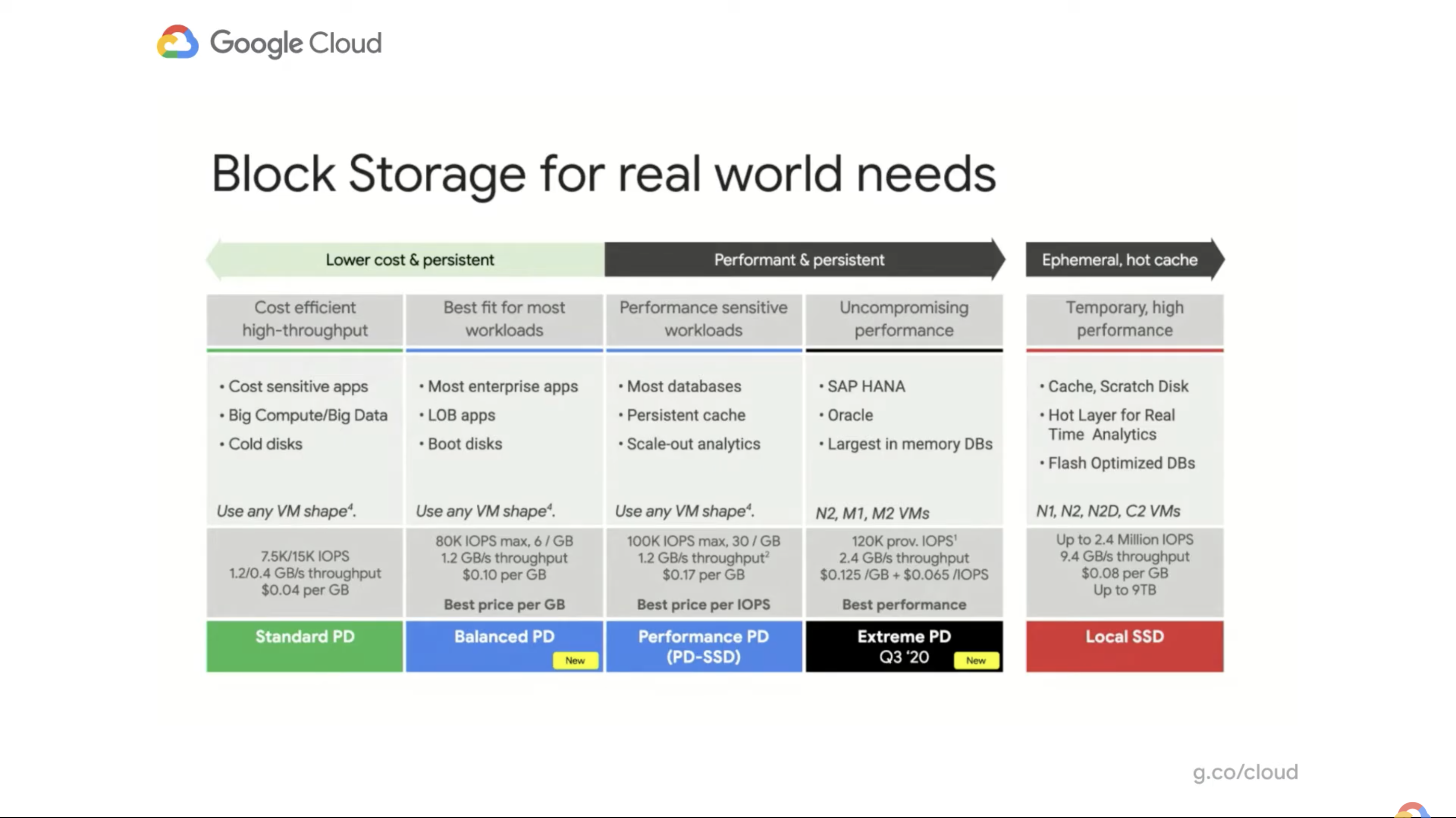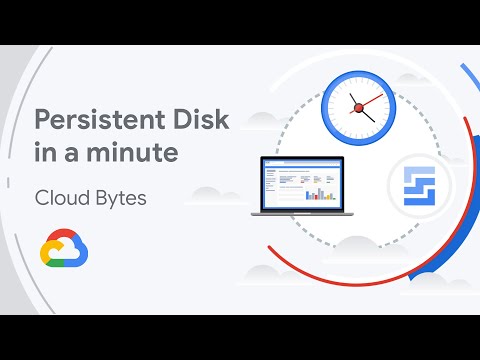Persistent Disk
Reliable, high-performance block storage for virtual machine instances. Enterprise scale, limitless flexibility, and competitive price for performance.
New customers get $300 in free credits to spend on Persistent Disk.
Get started today by creating or attaching a disk
Understand how to pick the best disk for your workload
A recent study shows our monthly machine costs are up to 80% less than other leading clouds
Benefits
Block storage that is easy to deploy and scale
Block storage that is easy to deploy and scale
No volumes, no striping, no sizing—just disks. Stop the headache of dealing with partitioning, redundant disk arrays, or subvolume management. Scale up or down as needed, and only pay for what you use.
Industry-leading price and performance
Industry-leading price and performance
HDD offers low-cost storage when bulk throughput is of primary importance. SSD offers consistently high performance for both random-access workloads and bulk throughput. Both types can be sized up to 64 TB.
Flexibility that comes with no downtime
Flexibility that comes with no downtime
Attach multiple persistent disks to Compute Engine or GKE instances simultaneously. Configure quick, automatic, incremental backups or resize storage on the fly without disrupting your application.
Key features
Key features
High-performance block storage for any workload
Persistent Disk performance scales with the size of the disk and with the number of vCPUs on your VM instance. Choose from the range of disk performance options that fit your business goals, and only pay for the storage you use.
Durability and availability that keep your business running
Persistent Disks are designed for durability. We automatically store your data redundantly to ensure the highest level of data integrity. Whether you're worried about planned maintenance or unexpected failures, we ensure your data is available, and your business stays uninterrupted.
Automatic security and encryption
Automatically encrypt your data before it travels outside of your instance to Persistent Disk storage. Each Persistent Disk remains encrypted with system-defined keys or with customer-supplied keys. Google distributes Persistent Disk data across multiple physical disks, ensuring the ultimate level of security. When a disk is deleted, we discard the keys, rendering the data irretrievable.
Data protection for business continuity
Protect your data with cross-zone synchronous replication, cross-region asynchronous replication, disk snapshots, and disk clones to ensure that data is recoverable when and where you need it. Replicating data to multiple points of presence gives your workload higher resilience and allows you to implement a multi-zone or multi-region business continuity strategy.
By using Persistent Disks we got very easy differential backups with Snapshots. Coming from a world where we did full backups every single day, this improved our backup times from two to three hours down to three minutes.
Jeremy Tinley, Senior Staff Systems Architect
What's new
What's new
Sign up for Google Cloud newsletters to receive product updates, event information, special offers, and more.
Documentation
Documentation
All features
All features
| Find the right price and performance for your workload | Persistent Disks come in four types at different price points and performance profiles. We've designed these disk types based on years of working with customers to understand the range of uses of our Persistent Disks. Understand the price and performance of each disk type. |
| Scale anytime: resize your block storage while it's in use | Persistent Disk allows you to flexibly resize your block storage while it’s in use by one or more virtual machines. Performance scales automatically with size, so you can resize your existing persistent disks or add more persistent disks to an instance to meet your performance and storage requirements—all with no application downtime. |
| Use disk clones to create new disks from a data source | Use Disk Clones to quickly bring up staging environments from production, create new disks for backup verification or data export jobs, and create disks in a different project. |
| Use Local SSD option for temporary storage | Local SSDs are physically attached to the server that hosts your VM instance. This tight coupling offers superior performance, very high input/output operations per second (IOPS), and very low latency compared to other block storage options. Local SSDs are often used for temporary storage such as caches or scratch processing space. |
| Automatic security and encryption | Automatically encrypt your data before it travels outside of your instance to Persistent Disk storage. Each Persistent Disk remains encrypted with system-defined keys or with customer-supplied keys. Google distributes Persistent Disk data across multiple physical disks, ensuring the ultimate level of security. When a disk is deleted, we discard the keys, rendering the data irretrievable. |
| Decoupled compute and storage | Your storage exists independently from your virtual machine instances, so you can detach or move your disks to keep your data even after you delete your instances. |
| Use snapshots to back up your data on a schedule | |
| Use Machine Images to store your disk metadata and permissions | Use a Machine Images to store all the configuration, metadata, permissions, and data from one or more disks for a VM instance running on Compute Engine. The VM instance that you use to create a machine image is referred to as a source instance. |
| Asynchronous Replication keeps your business running | Asynchronous Replication provides low recovery point objective (RPO) and low recovery time objective (RTO) block storage replication for cross-region disaster recovery (DR). In the unlikely event of a regional outage, Persistent Disk Asynchronous Replication enables you to failover your data to a secondary region so you can quickly restart your workload. |
| Regional Persistent Disk for high availability services | Regional Persistent Disk is a storage option that provides synchronous replication of data between two zones in the same region. Regional persistent disks offer zero RPO and low RTO and are a good building block to implement high availability services in Compute Engine. |
Pricing
Pricing
Each VM instance has at least one disk attached to it. Each disk incurs a cost, described in this section. In addition, if you use snapshots, there are separate snapshot charges.
For more detailed pricing information, please view the pricing guide.
Cloud AI products comply with the SLA policies listed here. They may offer different latency or availability guarantees from other Google Cloud services.
Ex: ORACLE® is a registered trademark of Oracle Corporation.
Take the next step
Start building on Google Cloud with $300 in free credits and 20+ always free products.
Need help getting started?
Contact salesWork with a trusted partner
Find a partnerContinue browsing
See all products













